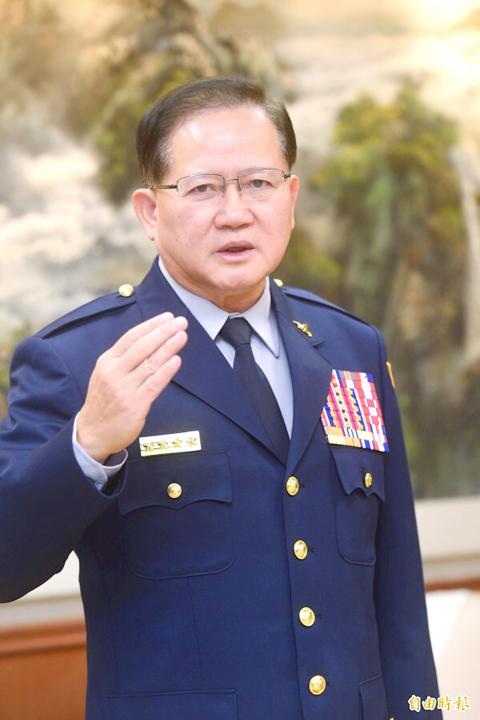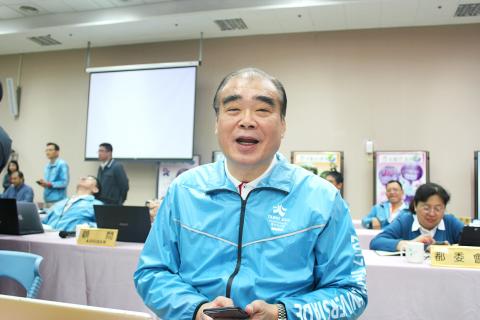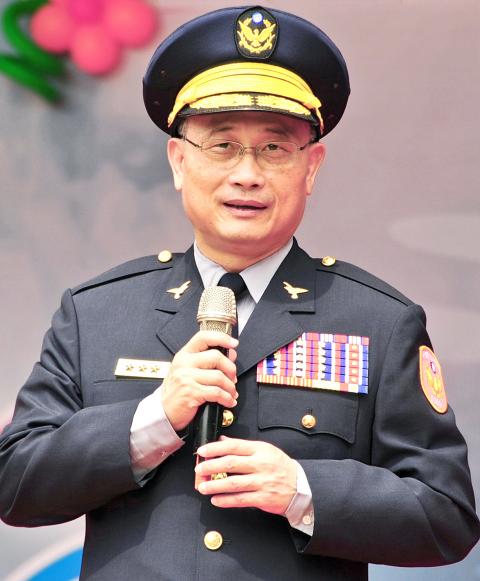A major reshuffle of high-ranking police officials on Tuesday took many by surprise, with several legislators saying it was a slap in the face for Taipei Mayor Ko Wen-je (柯文哲).
The Ministry of the Interior announced the reshuffle on Tuesday night, promoting Kaohsiung Police Department Commissioner Chen Chia-chin (陳家欽) to head the National Police Agency (NPA), while Taipei Police Department Commissioner Chiu Feng-kuang (邱豐光) was appointed his deputy.
NPA Director-General Chen Kuo-en (陳國恩) is to become deputy chief of the National Security Bureau.

Photo: Chung Chih-kai, Taipei Times
Taiwan Police College President Ho Ming-chou (何明洲) is to replace Chen Chia-chin as Kaohsiung police chief, while NPA Deputy Director-General Wei Ti-kun (衛悌琨) is to become the college’s new president.
Taichung Police Department Commissioner Chen Jia-chang (陳嘉昌) is to fill the vacancy left by Chiu, while NPA Chief Secretary Yang Yuan-ming (楊源明) is to become the new Taichung police chief.
The handover ceremonies are scheduled to take place today and tomorrow, the ministry said.

Photo: Shen Pei-yao, Taipei Times
Speculation had been rife that Chiu would be replaced as Taipei police chief after security breaches at the Taipei Summer Universiade opening ceremony on Aug. 19 led to protesters breaking police lines and delaying its start.
KMT legislators viewed the reshuffle as further evidence of a falling out between the Democratic Progressive Party (DPP) and Ko, an independent, who joined forces during the last mayoral election.
It is unprecedented for the Kaohsiung police chief to be promoted directly to head the National Police Agency, as they were usually appointed first to Taipei police chief, Chinese Nationalist Party (KMT) caucus deputy secretary-general Tseng Ming-tsung (曾銘宗) said.

Photo: Huang Liang-chieh, Taipei Times
The appointment was politically motivated and a snub by the DPP aimed at Ko, Tseng said.
Kaohsiung Mayor Chen Chu (陳菊) appears to have a great influence on the DPP’s “New Tide” faction and has become the “underground” go-to person for Executive Yuan personnel appointments, KMT Legislator Lee Yen-hsiu (李彥秀) said.
DPP Legislator Hsu Chih-chieh (許智傑) praised the reshuffle, saying Premier William Lai (賴清德) had the courage to “grasp the nettle” of security mismanagement.
Chiu’s transfer was an “obvious demotion” because the NPA deputy directorship is a high-ranking position, but carries little power, Hsu said.
The reshuffle was made to hold officers accountable for the Universiade security breaches, he said.
“The difference between being chief of a local police department and deputy director of the NPA is that in the local [police] department, you are the boss, while at the NPA, you only command a few secretaries,” DPP Legislator Huang We-cher (黃偉哲) said.
People First Party (PFP) Legislator Chen Yi-chieh (陳怡潔) said that the appointment was a sign that the central government was unhappy with police’s handling of protests nationwide.
The move was also a slight against Ko, she said, adding that the relationship between the DPP and Ko would not only affect local elections next year, but also the 2020 presidential election.
While the Ministry of the Interior had the power to appoint and transfer individuals for the NPA, it usually notifies local heads of government before making a move, New Power Party (NPP) Legislator Freddy Lim (林昶佐) said.
This breach of custom might affect interaction and cooperation between the Taipei Police Department and the Taipei City Government, Lim said, adding that the ministry should offer an explanation.
The reshuffle was in part due to the security breaches at the Universiade, which caused a delay in athletes entering the Taipei Municipal Stadium to participate in the opening ceremony, Minister of the Interior Yeh Jiunn-rong (葉俊榮) said on Tuesday.
The incident highlighted weaknesses in national security measures and measures to manage protests in Taipei, Yeh said.
That is why Chen Jia-chang, an expert in protest management and psychology, was chosen to head the Taipei Police Department, he said.
Despite relative stability over the past year, law and order work faces three immediate challenges: the threat of terrorist attacks, Internet fraud and drug-related crime, he added.

A magnitude 5.6 earthquake struck off the coast of Yilan County at 12:37pm today, with clear shaking felt across much of northern Taiwan. There were no immediate reports of damage. The epicenter of the quake was 16.9km east-southeast of Yilan County Hall offshore at a depth of 66.8km, Central Weather Administration (CWA) data showed. The maximum intensity registered at a 4 in Yilan County’s Nanao Township (南澳) on Taiwan’s seven-tier scale. Other parts of Yilan, as well as certain areas of Hualien County, Taipei, New Taipei City, Taoyuan, Hsinchu County, Taichung and Miaoli County, recorded intensities of 3. Residents of Yilan County and Taipei received

TRUST: The KMT said it respected the US’ timing and considerations, and hoped it would continue to honor its commitments to helping Taiwan bolster its defenses and deterrence US President Donald Trump is delaying a multibillion-dollar arms sale to Taiwan to ensure his visit to Beijing is successful, a New York Times report said. The weapons sales package has stalled in the US Department of State, the report said, citing US officials it did not identify. The White House has told agencies not to push forward ahead of Trump’s meeting with Chinese President Xi Jinping (習近平), it said. The two last month held a phone call to discuss trade and geopolitical flashpoints ahead of the summit. Xi raised the Taiwan issue and urged the US to handle arms sales to

Taiwan has secured another breakthrough in fruit exports, with jujubes, dragon fruit and lychees approved for shipment to the EU, the Ministry of Agriculture said yesterday. The Animal and Plant Health Inspection Agency on Thursday received formal notification of the approval from the EU, the ministry said, adding that the decision was expected to expand Taiwanese fruit producers’ access to high-end European markets. Taiwan exported 126 tonnes of lychees last year, valued at US$1.48 million, with Japan accounting for 102 tonnes. Other export destinations included New Zealand, Hong Kong, the US and Australia, ministry data showed. Jujube exports totaled 103 tonnes, valued at

BIG SPENDERS: Foreign investors bought the most Taiwan equities since 2005, signaling confidence that an AI boom would continue to benefit chipmakers Taiwan Semiconductor Manufacturing Co’s (TSMC, 台積電) market capitalization swelled to US$2 trillion for the first time following a 4.25 percent rally in its American depositary receipts (ADR) overnight, putting the world’s biggest contract chipmaker sixth on the list of the world’s biggest companies by market capitalization, just behind Amazon.com Inc. The site CompaniesMarketcap.com ranked TSMC ahead of Saudi Aramco and Meta Platforms Inc. The Taiwanese company’s ADRs on Tuesday surged to US$385.75 on the New York Stock Exchange, as strong demand for artificial intelligence (AI) applications led to chip supply constraints and boost revenue growth to record-breaking levels. Each TSMC ADR represents